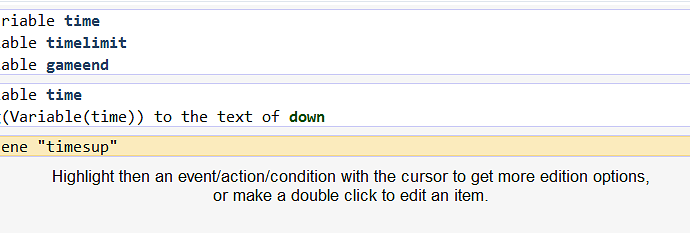Friends, I checked both site and Forum and wiki but I can’t find anything like that. Who knows?
What do you mean by time trial? Do you mean a time limit? If so, it’s discussed here:
If you are wanting to set time records, you could do something similar to what that thread says, but have it set a “record time” variable at the end of each run.
I don’t want to get into anything too deep just to find out I’m talking about the wrong thing, so could you clarify what you mean?
Or talking about a trial version of the app?
I think that I’m looking for Thank you. I’ll write the result when I tried.
I created what I want, but time is counting too fast, How Can I fix it?
Is the time scale set to 1?
How much “too fast”? If it counts up almost instantly, you might have < (less than) when it should be > (greater than). Also, if I remember correctly, timers aren’t exact and is based on rendering time and not system time (or something like that). TimeDelta() uses real time, so you could use something like Do +1*TimeDelta() to the variable Timer. Doing this will calculate time down to 10,000ths of a second (0.0000) in real time.
EDIT: It’s actually more precise than 0.0000, it just loses a decimal position the higher the seconds go.
I don’t see anything counting time there… timers or TimeDelta(). If you are wanting to count down, use:
Do -1*TimeDelta() to variable XTo count up, use:
Do +1*TimeDelta() to variable XThe way the other thread put it, using timers, it would be more like this:
[code]Condition:
The timer “(Timer name)” is greater than 1 seconds
Event:
Do +1 to variable X
Reset the timer “(Timer Name)”[/code]
That would count up. To count down use “-” instead of “+”.
I just ask you to prepare me an example?
What do you mean?
I couldn’t do it, I’m serious. There’s a problem somewhere.
Try this. It contains 2 scenes. One using timers, the other using TimeDelta().TimerProject.gdg (21 KB)
Thanks you, problem solved.
![]()
